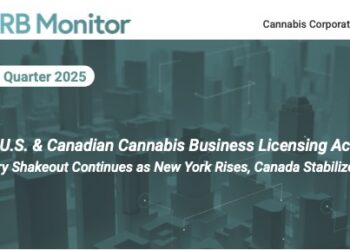Washington State’s Liquor and Cannabis Board (LCB) is pushing back against yet another attempt to subvert social equity licensing progress in states with legal adult-use cannabis. The state was successful in defending a previous dormant commerce clause challenge, but this time Washington faces a plaintiff that has seen success in other courts.
“Peridot Tree WA seeks—on an emergency basis—to rewrite Washington’s marijuana laws to allow out-of-state citizens to apply for and receive Washington marijuana licenses by petitioning for a declaratory judgment based on a federal constitutional challenge to Washington’s Residency Requirements and the Social Equity Scoring criteria,” said the state’s 27-page response in opposition to a TRO request. “This court rejected an almost identical challenge to Washington’s Residency Requirements earlier this year and should do so again here.”
Peridot’s 51% owner, Kenneth Gay, a Michigan resident who has challenged residency and social equity requirements in New York and California, sued the State of Washington on Dec. 4, claiming that its new social equity license scoring violates the U.S. Constitution’s dormant commerce clause. As with his prior cases, Gay argues that although cannabis remains illegal on the federal level, state laws that restrict the flow of commerce across state lines, such as investment in cannabis businesses, are unconstitutional.
“Defendants enacted laws that provide a preference to Washington residents over out-of-state residents for the application program for licenses. In doing so, defendants violated the dormant Commerce Clause of the United States Constitution,” said the lawsuit, which was filed in the Western District Court of Washington.
The Evergreen State opened an application period for up to 46 cannabis operators that qualify as social equity candidates on March 1. The application process gave preference to Washington state residents who fulfill two of the three following conditions: individuals who live in disproportionately impacted areas in the state for at least five years between 1980 and 2010, individuals or family members of those prosecuted for cannabis offenses, or applicants whose household income was below the state’s median household income. This application period lasted until April 27.
“I live in an area of Michigan that was designated by the State of Michigan as having been disproportionately impacted by marijuana prohibition and enforcement and is eligible for Michigan’s Social Equity Program for cannabis. I have lived in my current home continuously since 2000,” said Gay in a declaration he filed in support of the temporary restraining order his company is seeking against the State of Washington. “I was arrested for growing cannabis in 2007 and convicted of a cannabis offense under Michigan law in 2009.”
The state cited a prior case in Washington where Idaho resident Todd Brinkmeyer sued the LCB to block its residency requirement for licensing. The case was originally filed in Thurston County Superior Court and was then removed to federal court where it was dismissed based on the reasoning that the dormant commerce clause does not apply to federally illegal industries. Brinkmeyer appealed that case to the Ninth Circuit Court, which dismissed the appeal without issuing an official opinion on the legal matter.
Brinkmayer currently has stakes in five separate cannabis businesses in Washington, according to the CRB Monitor’s licensing database.
Gay, who has a prior cannabis conviction, but not in New York, sued the Empire State on Sept. 26, 2022, claiming that the state’s Conditional Adult Use Retail Dispensary License (CAURD), which is restricted to residents with a prior cannabis conviction in the state, violates the dormant commerce clause.
The lawsuit resulted in a court order preventing the roll out of CAURD licenses until the following spring.
New York regulators approved a settlement with Gay’s business, Variscite, on May 30, which allowed the state agency to resume licensing Conditional Adult Use Retail Dispensaries, while also awarding a retail license to Variscite in the Finger Lakes region of New York. Because the case ended in a settlement, there was no precedent-setting court order.
By the end of 2022, Gay and Variscite sued to halt municipal-level social equity programs in the cities of Sacramento and Los Angeles.
Gay’s claims against Sacramento lost in federal court. Variscite appealed to the Ninth Circuit Court of Appeals, which heard arguments from both sides on Nov. 15, 2023. The Ninth Circuit has yet to issue an opinion on the matter. The case against Los Angeles will remain on hold until the circuit court weighs in.
A circuit ruling in favor of Sacramento, upholding that city’s social equity program, could conflict with a prior ruling from across the country in the First Circuit Court of Appeals from Aug. 17, 2022. In that case, the court upheld a federal decision striking Maine’s residency requirement for medical cannabis business license holders.
In this case, the judge determined that while selling cannabis is federally illegal, investing in a cannabis company is not, so the dormant commerce clause applies.











